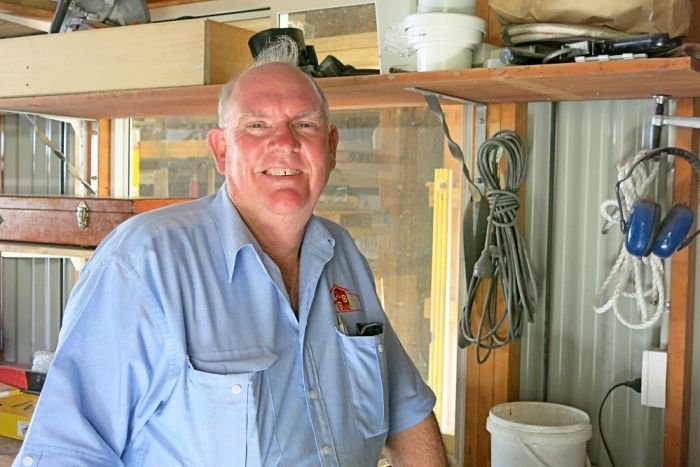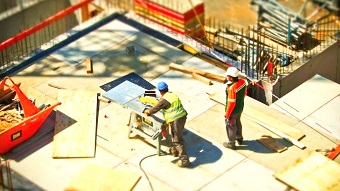
Tradies value tools more than health, but attitudes are changing
Posted

Photo:
Trevor Boswood says the physical nature of the building industry is tough for older workers. (ABC Capricornia: Jacquie Mackay)
A national survey shows for the second consecutive year that tradies are more likely to take better care of their tools than their physical or mental health.
Key points:
- A national survey of more than 800 tradies has given a snapshot of their attitudes toward health and safety issues
- The Australian Physiotherapy Association says attitudes are improving but tradies still valued tools over their health
- Queensland tradie says despite the physical impact on his body, he would struggle to put his tools down for good
The Australian Physiotherapy Association’s (APA) Tradies health survey of more than 800 construction tradespeople, showed that while attitudes toward health and safety have improved, the organisation found some perspectives “concerning”.
APA national president Phil Calvert said that included the industry’s “blokey culture”.
Of those surveyed, 87 per cent were men and 13 per cent women, comprising technicians, trade workers, labourers and machine drivers and operators.

State of the tradie:
- 88 per cent take care of the tools but only 60 per cent look after their body and mental health
- 70 per cent consider themselves fit and try to eat healthy
- 69 per cent believe its normal to be sore as a result of their work
- 25 per cent are comfortable to talk to a co-worker about a mental health issue affecting their work
- 32 per cent don’t follow safe lifting guidelines
- 42 per cent push their body past healthy limits
- 48 per cent haven’t taken a sick day in the past six months
Source: APA 2019
“While tradies appear to be reluctant to open up to their workmates and bosses about mental health issues in particular, 73 per cent said they wouldn’t think any less of their workmates for taking time off for mental health concerns,” Mr Calvert said.
“So it seems they have a tougher expectations of themselves than their co-workers.”
Mr Calvert said with regard to physical fitness, the majority of respondents were open to the idea of a “warm up” at the start of the day if their boss was supportive.
“Tradies should look at all options to make sure they are in the best physical and mental shape to get through the day,” he said.
“That might include warmup stretches at the start of the day and open dialogue with bosses and co-workers about personal injuries or issues affecting their work.”
Prevention better than cure
Rockhampton physiotherapist Lesley Smith agreed.
“A lot of injuries come through repetitive strain and that’s why regular breaks and regular stretching is also important especially with tasks like hammering, or drill work where we’ve got that constant gripping,” she said.
“If they do a lot of work leaning forward, obviously keeping those particular muscles stretched out is also important.”
David Hall, the APA’s national chair of occupational health physiotherapy, said the goal of the survey — released today at the start of Tradies National Health Month — was to highlight that tradies needed to be vigilant with self care in order to continue working later in life.
He said as tradies aged, they were inclined to suffer from lower back pain, followed by shoulder and neck-related issues and knee problems.
“It’s a common challenge for older tradies because when they were younger, they didn’t have the same sort of attention and focus on safe work practices as what we have today,” Mr Hall said.
“You don’t want to give up on a type of work that’s actually going to potentially keep you fit and well, if you do it well.
“If you can do the job in a conscious, mindful way and not fall into the trap of rushing and pacing yourself, well you’ve got huge advantages over people who sit in an office or vehicle all day.”
Taking its toll after 40 years
Queensland tradie Trevor Boswood knows all too well the impact that four decades in the industry has had on his body.
He laughed off the fact that he cannot hammer above his shoulder height anymore.
“I don’t think it’s a trade for an old person these days, although it’s probably getting easier but it’s still a heavy trade,” Mr Boswood said.
“Back in my day, you never got a lot of advice about anything you just got told to, ‘Rip in and do it’ and that could lead to over doing it, so you feel it later in life.”

Photo:
Rockhampton tradie Dave Boswood feels the aches and strains from more than 20 years on the job. (Supplied: Trevor Boswood)
Mr Boswood said his son Dave — who followed in his father’s footsteps — has already experienced issues with his knees, ankles and shoulders.
But he believed improved standards, safety rules and regulations over the last 40 years have changed the industry for the better.
“The industry has changed a lot because you’re not working as hard,” he said.
“You have better tools, better designs and improved safety so you’re just not making silly decisions and you are better off.”
“With today’s rules and regulations, you are working safer than what you ever were before, now lifting less and less.”
Now in his 60s, Mr Boswood said he was considering retirement in the next couple of years but he would not put his tools down for good despite years of wear and tear on his body.
“[I’ll] always keep doing small jobs because if you don’t use it, you lose it.”
Topics:
occupational-health-and-safety,
